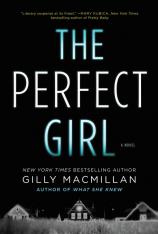Excerpt
Excerpt
The Perfect Girl

Sunday Night
The Concert
ZOE
Before the concert begins, I stand inside the entrance to the church and look down the nave. Shadows lurk in the ceiling vaults even though the light outside hasn’t dimmed yet, and behind me the large wooden doors have been pulled shut.
In front of me, the last few members of the audience have just settled into their places. Almost every seat is filled. The sound of their talk is a medium-pitched rumble.
I shudder. In the heavy heat of the afternoon, when I was sweaty and tired after rehearsing, I forgot that it could be cold in the church even when the air was oven hot outside, so I chose a little black dress to wear this evening, with skinny straps, and now I’m feeling the chill. My arms are covered in goose bumps.
The doors to the church have been closed, sealing out the heat, because we don’t want outside noise to disturb us. This suburb of Bristol isn’t known for its rowdy inhabitants, but people have paid good money for their tickets.
And it’s not just that. The thing is that this concert is my first performance since I left the Unit, and my first performance as part of my Second Chance Life.
As my mum said, only about a hundred times today, “This performance must be as perfect as it’s possible to be.”
I glance at Lucas, who’s standing beside me. Only a millimeter or two of air separates us.
He’s wearing black trousers that my mum put a crease in this afternoon, and a black shirt. He looks good. His dark brown hair is just about tamed into neatness, but not quite, and I think that if he was bothered to, he could make those girls who are still lame enough to read vampire romance stories wilt.
I look good too, or I will when the goose bumps subside. I’m small-boned, I have pale, clear skin, and my hair is long and very blond but thin: cobweb-caught-in-sunlight hair, which looks amazing against my black dress. In the right light my hair can look white, and this gives me a look of innocence.
“Like a baby deer, fragile, delicate” was how the prosecutor described me, which I thought was quite nice, though it still hurts me to remember that she added “but don’t be fooled.”
I flex my fingers and lace them together to make sure the gloves I’m wearing are fitting extra snugly, the way I like them, and then I put my arms to my sides and shake them, to get my hands moving. I want my fingers to be warm and flexible. I want them pulsating with blood.
Beside me, Lucas shakes his hands too, slowly, and one at a time. Pianists catch hand shaking from each other like other people catch yawns.
At the far end of the nave, in front of the altar, the grand piano stands on a low platform, its hammer and string intestines reflected on the underside of the propped-up shiny black lid. It’s waiting for us. Lucas is staring at it, completely focused, as if it represents a vertical glacier that he has to ascend with his bare hands.
We have different approaches to nerves. He becomes as still as possible, he starts to breathe through his nose, slowly, and he won’t respond to anybody.
In contrast, I fidget, and my mind can’t rest because it has to run through the things I have to do, in the order I have to do them in, before I begin to perform. It’s not until I play the first note that the concentration I need, and the music itself, will wrap around me, pure and white like a shroud, and everything else will disappear.
Until that point, I’m sick with nerves, just like Lucas is. Beside the piano, a lady has been introducing the concert, and now she gestures toward us, and then sort of scrapes and bows her way off the stage.
It’s time for us to go on.
I pull my gloves off quickly, and drop them onto a table beside me where the coffee and catechism leaflets are, and Lucas and I walk together down the aisle as if we’re play- acting a wedding. As we do, the heads of the audience turn to look at us, each row triggering the next.
We walk past my aunt Tessa, who’s in charge of a camera that’s been set up to record our performances. The idea is to replay them later, to analyze them for imperfection, and identify areas where improvement can be squeezed out of us. Tessa is squinting a bit nervously at the camera as if it might turn around and lick her face, but she gives us a thumbs-up. I love Tessa; she’s like a much more chilled-out version of my mum. She has no kids of her own and she says that makes me all the more special to her.
The other faces in the church smile as Lucas and I walk between them, creasing deeper into expressions of encouragement as we approach. I’m seventeen now, but I’ve known this look since I was a little child.
Mum describes these sorts of people as our “supporters.” She says they’ll turn up to watch time and time again if we play well, and they’ll tell their friends. I don’t love the supporters, though. I don’t like the way they come up to you at the end of a concert and say stuf f like “You have such a gift,” as if piano playing isn’t something that you work on day in and day out, if you want to make it perfect.
You can almost see the word “genius” flashing up like a neon sign in their minds, temptingly bright. Beware that sign, I would say to them, if they asked. Be careful what you wish for, because everything has a price.
In the front row of the church, the last pair of faces I focus on belong to my mum and Lucas’s dad. Or, to put it another way, my stepdad and his stepmum, because Lucas and I are stepsiblings. As usual, they’re wearing the too-bright expressions of parents who are disguising a level of ambition for their children that could choke you.
Lucas is ahead of me by the time we get to the end of the aisle and he’s already taking his seat as I step up onto the plat- form where the piano sits.
We’re going to start by playing a duet. It’s a crowd pleaser, the brainchild of our parents. Plus, they think it’ll help us to calm our nerves if we play together at the beginning.
Lucas and I would both rather play alone, but we humor them, partly because we have no choice, and partly because we’re both performers at heart and a performer wants to per- form, needs to perform, loves to perform.
A performer is trained to perform.
So we’ll do it, and we’ll do it as well as we can.
As I sit down at the piano, I keep my back straight and I’m smiling for the audience even though my insides have constricted and twisted so they feel like a ball of elastic bands. But I don’t smile too much. It’s important that I look humble too, that I get my performance face just right.
There’s a bit of fuss while Lucas and I get settled and adjust the piano stools. We already know that they’re perfectly positioned, because we tried out the piano before everybody arrived, but still we fiddle about with them, the spacing of them, a tiny height adjustment. It’s part of the performance. It’s nerves. Or showmanship. Or both.
Once we’re both sitting perfectly, I place my hands over the keys. I have to work hard to control my breathing because my heart is hammering but my focus sharpens onto the music that’s ahead, all of me waiting to hear those first notes now, like a starting gun at the beginning of a race.
The audience is hushed. Just a cough from somebody that echoes around the vaults and columns. Lucas waits for the sound to disappear and, in the absolute silence that follows, he first wipes his palms on his trouser legs and then he positions his hands over the keys.
Now that smooth run of black and white stretching out beneath our hands is everything and I watch his hands as intently as an animal ready to pounce. I mustn’t miss his cue. There’s a beat or two more of perfect silence before he arches his palms and his hands bounce lightly: once, twice, three times.
Then we’re off, in perfect synchrony.
We dazzle when we do this; everybody says so. The energy two players produce can be electrifying when it’s right. It’s a tightrope act controlling the power, the tone, and the dynamics, because all of it must be perfectly balanced, and it wasn’t so good this afternoon when we got tired and cross with each other while practicing in the heat, but tonight, it’s brilliant. It’s seamless, beautiful, and we’re right in the music, both of us, and I’ll admit that doesn’t always happen. Mostly doesn’t happen.
In fact, I’m so into it that at first I don’t hear the shouting, and not hearing the shouting means that I don’t realize that what’s just begun is the end.
But I wish I had realized. Why do I wish that?
Because, six hours later, my mother is dead.
The Perfect Girl
- Genres: Fiction, Psychological Suspense, Psychological Thriller, Suspense, Thriller
- paperback: 464 pages
- Publisher: William Morrow Paperbacks
- ISBN-10: 0062476769
- ISBN-13: 9780062476760




